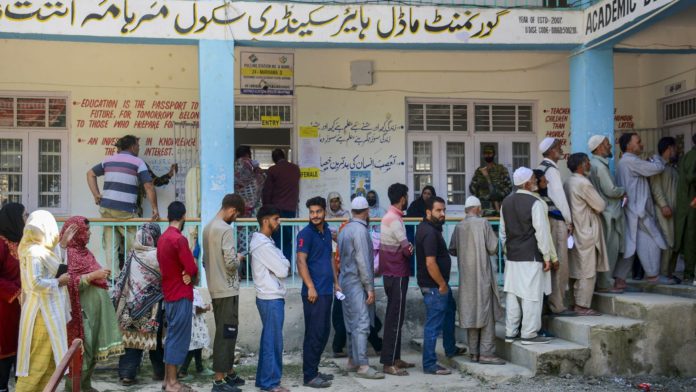Voting for the second phase of the assembly elections in Jammu and Kashmir began on Wednesday morning with tight security arrangements. Over 2.5 million voters are set to decide the fate of 239 candidates across 26 seats, including former Chief Minister Omar Abdullah. The polling began at 7 am across six districts—three in the Valley and three in the Jammu division—with 3,502 polling stations established by the Election Commission of India, including 1,056 urban and 2,446 rural polling stations.
Security has been heightened with a multi-tier security arrangement involving police, armed police, and central armed paramilitary forces to ensure safe and peaceful voting. Special arrangements include 157 designated polling stations: 26 ‘pink polling stations’ managed by women, 26 manned by specially-abled persons, 26 by youths, 31 border polling stations, 26 green polling stations, and 22 unique polling stations.
In this phase, 93 candidates are contesting in Srinagar, 46 in Budgam, 34 in Rajouri, 25 in Poonch, 21 in Ganderbal, and 20 in Reasi district. Key constituencies include Hazratbal, Khanyar, Habbakadal, Lal Chowk, and Channapora in Srinagar; Budgam and Chrar-I-Sharief in Budgam; and Reasi, Nowshera, and Rajouri in Jammu division.
Among the prominent candidates are Omar Abdullah, contesting from Budgam and Ganderbal, JKPCC president Tariq Hamid Karra from Central Shalteng, and BJP J-K chief Ravinder Raina, aiming to retain his Nowshera seat. Notably, jailed religious cleric Sarjan Ahmad Wagay alias Barkati is contesting from Beerwah and Ganderbal, hoping to replicate the success of Engineer Rashid, who defeated Abdullah in a parliamentary election earlier this year from Tihar jail.
The first phase of polling saw a turnout of over 61%, and the third phase is scheduled for October 1, with vote counting set for October 8. Voting for the second phase will continue until 6 pm today.




